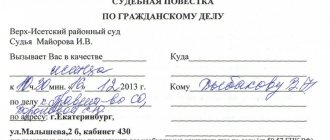The defining moment of any interrogation is the behavior of the person being interrogated. It doesn’t matter in what status you are participating in the interrogation - they accuse you or are simply waiting for an explanation of the case - you need to behave equally calmly and confidently. The task of the Investigative Committee employees is to bring the citizen to confession. Your task is not to harm yourself in any way.
To avoid becoming a victim of provocation or psychological pressure, enlist the support of a lawyer. This is the main rule - never come to interrogation without your lawyer.
Only a lawyer will be able to impartially assess the situation, find the right approach and develop the optimal behavior strategy for you.
Do you want to figure it out, but don’t have time to read the article? Lawyers will help
Entrust the task to professionals. Lawyers will complete the order at the cost you specify
25 lawyers on RTIGER.com can help with this issue
Solve the issue >
How is the interrogation going?
Questioning and interrogation are two legal terms that seem similar, but differ significantly in their composition. Before opening a case, it is checked and a survey is organized to identify key circumstances.
The investigators are interviewing, not the investigator. Their task is to check the basic facts and provide evidence to the investigative committee. A citizen has the right to refuse to participate in the survey; this will not be a reason for imposing additional liability.
If a case is opened following an inspection, it will be dealt with by an investigator. He also calls the citizen for questioning. The challenge can be either oral or official - in the form of a summons.
You cannot ignore it, otherwise it will be regarded as evasion and will lead to corresponding consequences. The summons is always handed over against signature - personally or to any adult family member. If you are summoned verbally (by telephone), still request a subpoena form. An official summons must indicate the date, time, place of interrogation, the status of the person being summoned, and the consequences for avoiding testifying.
Let us say right away that all summoned persons are required to testify. Only suspects or those already accused in a case can refuse to testify.
The order of interrogation depends on the status of the person being interrogated. A citizen can be involved in a case as a witness, suspect or person giving explanations. Therefore, before starting a conversation, find out this point from the investigator and only after that work out your line of behavior.
So, you have received a summons for questioning - you need to go to the investigator, there is no other option. Your further task is to monitor the correctness of his actions. Here are the basic rules for interrogation:
- the first thing the investigator must do is to establish the identity of the person being interrogated;
- then the law enforcement officer explains the reason for the call and lists all the rights and obligations of the person being interrogated;
- then the official conversation itself begins in the format “investigator’s question - answer of the person being interrogated”;
- the entire course of the interrogation is noted in the protocol;
- The investigator is obliged to keep a protocol, and the citizen has the same right - the interrogated person can record all questions and answers on paper in his own hand.
The suspect and the accused may not testify, but the witness is obliged to answer the investigator all questions asked during the interrogation. Here's what absolutely everyone should remember - the Constitution of the Russian Federation gives citizens the opportunity not to testify against themselves and their close relatives (Article 51 of the Russian Federation).
Don't forget about the physical rules. The interrogation is limited in time - the maximum time for conversation is 8 hours. If a conversation lasts four hours without a break, then the parties are required to break for an hour to rest.
Another rule is the tone of communication. The investigator should not cross boundaries, threaten, pressure or dictate. The interrogated person, in turn, must communicate strictly, but politely and not be rude to the representative of the law.
Well, the most important rule is that all conversations during interrogation are best conducted only in the presence of a lawyer. If it is not possible to use private legal services, you can request a human rights defender from the investigation, but this is definitely not the best solution.
A lawyer you can completely trust is not only your defense, but also a guarantee of a positive outcome of any interrogation.
What rights of the interrogated person are often violated by the investigator?
- People are not called in for questioning over the phone. But in certain situations, a citizen could confirm in advance with written consent the possibility of a call in this form.
- You have been served with a summons. The investigator knows this because he himself directed her. Then there is no point in avoiding coming to his office at the designated time. But sometimes the investigator may ignore significant circumstances that caused the failure to appear.
- Continuous interrogation for more than 4 hours is a violation of the law. The interrogation must be interrupted for at least 1 hour. During the day, an investigator can interrogate a person in any status for no more than 8 hours.
- At night (after 10 p.m.), investigative actions are usually not carried out. Although there are situations that may be considered urgent. Then the person being interrogated must provide his consent to the night interrogation. The citizen needs to decide whether it is advisable to give such consent. It is very important to take the advice of your lawyer here.
Therefore, it is necessary to ensure that the time indicated in the protocol does not differ from the actual time of the interrogation . If a discrepancy is found, this factor is indicated in the “Comments to the protocol” column.
If the interrogation drags on or goes into the night, you have the right to declare:
- that you feel physically tired;
- that you lose the opportunity to give intelligible testimony;
- If you are used to sleeping at this time, you may confuse something in your testimony.
By the way, the investigator is capable of inciting and moving the clock (applies to the arrested person under investigation). You need to make sure this doesn't happen. You will need to find out the exact time before entering the investigator’s office.
How to behave during interrogation
Presumption of innocence - always think about this concept when going for interrogation in any status. What does it mean? Until guilt or innocence is proven, no one has the right to accuse the suspect. This is a basic legal principle that must be respected both during interrogation and in court. If the investigator or judge has certain doubts, until guilt is proven, they are interpreted in favor of the suspect.
Remember to maintain the presumption of innocence when speaking with government officials. Moreover, the law does not prohibit answering only a number of questions - if you consider it necessary to remain silent or not give your answer, you have the right to do so, and no liability will follow for this.
The investigator should ask direct questions - not leading or hinting, but only those that are directly related to the case. If the question is not related to the investigation, do not give your answer. Any third-party statement from the person being questioned can be used against him in court.
In general, the procedure for behavior during interrogation can be formulated through several key factors. Here are some things to keep in mind during a formal conversation with law enforcement.
Behavior
Remember one golden rule. It is better for the interrogated person to remain mostly silent. Speak only by answering the questions posed, and strictly on the topic, without citing unnecessary facts. You must be calm and confident; emotions are definitely not necessary here. Before starting each answer, pause and always think about your remarks.
Take your time, don’t push yourself, and don’t be rude to the investigator under any circumstances. At the same time, try not to look into his eyes - find a distracting object and study it with your eyes.
This technique will help you concentrate and not say too much. Do not show your fear and do not ask the investigator for anything. And, of course, don’t lie—focus on the real facts and their consistency. This is the main line of behavior - calmness, confidence, politeness (but in no case ingratiation) and clarity.
Protocol
This is an important point. The entire conversation must be recorded. The records compiled will play an important role in court. Therefore, the interrogated person must control the progress of drawing up the protocol.
If the investigator does not keep this document, demand that it be drawn up. The report must be signed by all participants in the conversation - the investigators and the person being interrogated.
If you are not provided with a recording document to sign, it automatically becomes invalid. The signature must appear on every page.
If the conversation is conducted by an investigator who is not listed in the protocol, this is an offense, and his questions may not be answered. Always read the protocol before signing and note any procedural violations therein. If the investigator did not include or concealed important details received from the person being interrogated, note this fact and only then sign the protocol.
Should we trust the investigator's words?
The first thing you need to realize is that the investigator under no circumstances can be considered an ally of the person being interrogated. Even if the person who appears when called acts as a victim, he still cannot know what tasks the investigator sets for himself. It is quite possible that the defender of the rule of law has some side interests. Therefore, he will try to present the victim as a subject who did not suffer too much or is “to blame”, or is pointing in the wrong direction. And he will make the witness a false witness.
The investigator is not an ally of the person being interrogated, but his dangerous traveling companion. Even if a law enforcement officer confidentially tells a citizen present during an interrogation some information, this does not mean that the information is true. If he claims that he is acting in the interests of the person being interrogated, this cannot be trusted either. The interests of a citizen, and not abstract legality, can only be defended by a lawyer. This is both the direct task of the hired defender and his responsibility.
Stage 2. Interrogation in the investigator’s office
Before starting the interrogation, the investigator records in the protocol the personal data of the interrogated:
- Full name, date of birth;
- Permanent residence address;
- Family status;
- Place of work;
- Criminal record information, etc.
When asking a question about how to behave during interrogation by an investigator, it is important to remember that you have the right to testify in your own hand.
In other words, if you're afraid you'll mumble or fumble your words, you can put them on paper.
When conducting an interrogation, the investigator is obliged to enter into the protocol information about all persons present in the office, and you have the right to demand documents from them. This will avoid the presence of unauthorized persons during the interrogation.
If the question the investigator asks is not clear to you, politely ask for clarification or write it down in the protocol. Make sure that the questions asked to you are recorded not in a draft, but in an official document.
You have the right not to answer a question written in a draft. In addition, no one has the right to force you to testify against yourself - Article 51 of the Constitution of the Russian Federation.
Remember that you have the right to refuse to take any action if:
- If you are being blackmailed;
- If they ask you to sign the protocol without reading it;
- If questions are asked that are not relevant to the circumstances of the case under investigation.
In this case, it is necessary to demand the termination of the interrogation and make an appropriate entry in the protocol. And then you should contact higher management and a lawyer.
If you are beaten, try to resist and leave the premises if possible. If there are marks on the body, contact a medical organization to remove the beatings, and then file a statement with the police.
Responsibilities of the investigator
General responsibilities of an investigator include:
- Documentary recording of the interrogation procedure;
- Compliance with the procedural elements of the procedure. For example: Warning the interrogated person about liability for giving false testimony;
- Filling out the protocol;
- Collection of signatures of witnesses, etc.
- Sending a summons by courier or mail;
Depending on who acts as the person being interrogated, new duties may be added, for example, the duty to engage a psychologist to interrogate a person under 16 years of age, etc.
Investigative tricks and deception of the investigator during interrogation
Of course, not all investigators are as bad as in Russia for some reason people tend to think, but they can also use various tricks and psychological techniques to conduct interrogation and obtain the necessary data from you, even if it is not the truth.
The most common tricks are:
- The investigator may behave like your best friend during the interrogation in order to earn trust and you, having been exposed to his charm, can sign the protocol without reading;
- The investigator may give you a blank protocol form to sign and make notes on the draft, as if, for example, so as not to waste a lot of your time.
- Even if the investigator promises that all your statements will be entered later, this does not mean at all that they will correspond to what you said during the interrogation;
- The investigator may leave empty spaces in the protocol in which you can then write something, so when reading the protocol, put dashes in the empty spaces;
- Pre-planned long interrogations in order to exhaust you and force you to agree to any of his demands just to end the interrogation as quickly as possible;
- The investigator can provide you with a state lawyer in advance who is not interested in your successful conduct of the case, and therefore the investigator’s work is simplified.
In addition to the above, make sure that there are no empty spaces in the interrogation protocol and the investigator will set the time and date of the interrogation.
Please note that Russian legislation is constantly changing and the information we write may become outdated. In order to resolve the issue you have regarding Criminal Law, we advise you to seek the advice of a lawyer in support of the site.
Methods of transmitting a subpoena
According to Part 2 of Art. 188th Code of Criminal Procedure of Russia, a summons can be:
- Handed to a citizen who is summoned for questioning, necessarily against his signature. If he is temporarily absent, the summons may be served on one of his family members who have already reached the age of majority.
- Transmitted using various means of communication.
- Transferred to the administration of the organization in which the called person works.
- Delivered to other persons or organizations if ordered by the investigator.
Note that in the first three cases, the summons is served by the investigator, the inquiry officer, or the court. In the fourth case, it can be handed over to the police (the body of inquiry).
Often, the police, in the absence of the addressee , try to pass the summons through third parties (neighbors, concierges, etc.) or simply leave it in the door slots of the addressee’s entrance doors.
Such methods of transfer are not provided for by the Code of Criminal Procedure of the Russian Federation. Therefore, persons not provided for by this code do not bear any responsibility for the transmission of such a summons.
Calling the police by phone
Does the investigator have the right to call for questioning by telephone? I think this question is of interest to many, especially those who have already had similar situations of being called for questioning by telephone, without an official summons.
As a rule, people do not know whether this is legal and how to react in such cases. Most of them even refuse to talk on the phone and demand to send a summons.
However, in the form of such a summons there is even a space provided for noting that it was served by telephone. So it's completely legal.
But in practice, it will be quite difficult for law enforcement officers themselves to prove that they spoke with the person they called.
And a citizen, in turn, may not appear for questioning if he is summoned to it by telephone. Since he also cannot be one hundred percent sure that it is the interrogator or investigator who is talking to him.
Read about whether it is possible to identify scammers by phone number here.
Important conditions for interrogation
Firstly, investigative actions do not allow the use of any illegal measures:
- threats against the person being interrogated (an example would be a promise to deprive one of his freedom and put him in a special cell - the so-called press hut with notorious scum);
- threats that affect the interests of relatives or friends;
- gross psychological influence (pressure) of another kind;
- use of physical violence in any form.
If it turns out that the investigator tried to obtain information through illegal means, he can subsequently be held accountable under Art. 302 of the Criminal Code of the Russian Federation. For blackmail, the investigator himself can be imprisoned under this article (clause 1) for a maximum of 3 years, and for physical influence (torture, bullying) - for a maximum of 8 years (clause 2).
Secondly, all comments should be included in the protocol, even if they seem unnecessary to someone. It is best to make an audio recording without advertising these actions. You do not need to obtain permission from the investigator for such an audio recording, since here you are recording your voice. That is, you just need to conditionally get permission from yourself.
Naturally, it is better even for a witness to appear for questioning accompanied by a lawyer. If you initially appear when called with a lawyer, many questions may disappear by themselves. The defense lawyer will also explain to his client how interrogation techniques have changed in the context of the development of the pandemic.
If you appear without a defender of your rights and interests, and during the interrogation a difficult or clearly unfavorable situation arises for the interrogated person, he has the right to petition for a break in the interrogation. The reason is to ensure the participation of a lawyer. But the investigator may refuse. In this case, you should refer to poor health and state the need to postpone the interrogation to another day. And even then you will be provided with reliable legal protection.
What may be the consequences of failure to appear?
In case of failure to appear for interrogation , when there is a summons for it and evidence that the summons itself has been received by the addressee, the investigator may resort to bringing in the witness he needs.
This is relevant for those cases where there is evidence that the evasion of this appearance is deliberate, and the summoned person does not have any valid, serious reasons for this.
Deportation means forced delivery for interrogation. A special resolution is issued for this purpose. Well, it must contain the following information:
- Full name of the citizen being delivered;
- the address where he lives;
- the purpose of its delivery.
The very function of delivering a witness for interrogation is assigned to the bodies of inquiry (investigative officers, investigators, district police officers).
The drive procedure is not applicable only to adolescents under fourteen years of age, pregnant women and citizens with serious illnesses.
In addition, the Criminal Procedure Code allows for the use of other coercive measures:
- Obligation to appear. It is assumed that the summoned person is not only obliged to appear for all calls for questioning, but also does not have the right to change his place of residence without notifying the authorities conducting the investigation.
- Monetary penalties.
The investigator has the right to draw up a protocol stating that the witness does not fulfill his obligations to appear when summoned and send it to the judicial authority. There, within five working days, the judge will consider this protocol, after which he will make a decision to collect a certain amount from the violator directly to the state treasury.
If citizens do not have valid and sufficiently serious reasons for failure to appear, then such irresponsible witnesses receive a fine of 2,500 rubles. up to 5000 rub.
Article 188 of the Code of Criminal Procedure of the Russian Federation on the procedure for summoning for interrogation
A citizen who is a victim or a witness in any case is summoned for questioning by an official summons .
And it must indicate who is being summoned for this interrogation and in whose role. It also indicates when (necessarily indicating the time), to which authority, at what exact address, and also indicates to whom specifically you need to appear. Among other things, the summons also spells out the consequences of a possible failure to appear if the summoned person does not have any valid reason for it.
The summons itself must be handed to the person who is summoned for this interrogation, necessarily against his signature, or transmitted through one of the methods of communication . If the summoned citizen is temporarily absent, then the summons can be served on a member of his family (who has just reached the age of majority) or transferred to the administration of the organization where the summoned person works.
The investigator can also entrust the transfer of this subpoena to other organizations or some individuals, and they, in turn, undertake to deliver it to the addressee.
A citizen who is summoned for questioning is obliged to appear at the time appointed by the official . If he understands that for some reason he will not be able to do this, he must notify the investigator about this in advance , and also specifically indicate the very reason for his failure to appear. Otherwise, he may be subjected to forced arrest or other measures may be applied to him as provided for in Article 111 of the Code of Criminal Procedure of the Russian Federation.
If the person being called has not yet reached the age of sixteen , then he can be called as a witness for questioning only through representatives established by law (parents/guardians), the administration of his place of study/work.
In this case, the serviceman
Comments
The subpoena is sent to the witness either by postal service, telegraph or fax, or by telephone. And in absolutely all of the sending methods we listed above, the sender himself must wait for confirmation of the fact that the summons has been received by the addressee . If it does not exist, then coercive measures to bring a citizen for questioning will be unacceptable.
As a rule, a witness can only be questioned on working days . But, if the situation is urgent, then exceptions to this rule are possible.
The summons itself for summoning a citizen as a witness for questioning in any case, drawn up in accordance with all the rules, is a document that can confirm a valid reason for the absence of the person being questioned from his workplace. In addition, it also serves as the basis for him to be reimbursed for the expenses he incurred during his appearance at this interrogation.
A prisoner can be called as a witness exclusively through the administration of the institution in which he is currently located (for example, a colony or a pre-trial detention center) and must be taken to the very place where this interrogation is taking place by her, with guards.
However, convicts who are held in any pre-trial detention center and act as a witness or victim in other criminal cases not committed by them, upon entry into force of their sentence, are not sent to places of serving their sentences, but for now remain in custody for a certain period of time. period established by law.
It is also worth noting that in the context of the article we are considering, the legal representatives of a teenager summoned for interrogation are: their guardians, trustees, adoptive parents, as well as representatives from various guardianship institutions or organizations.
Another feature: in the case of calling a teenager who has not yet reached the age of sixteen as a witness, the summons itself is addressed directly to him , but it is handed to his parents or other legal representatives. They, in turn, are obliged to ensure the teenager’s attendance.
Another procedure for calling a teenager under the age of sixteen for questioning is provided for in exceptional situations when an urgent questioning is required. Then he can be summoned without the knowledge of his family and friends , and his appearance is entrusted to law enforcement officers, who can turn to the educators or teachers of the summoned person for help.










